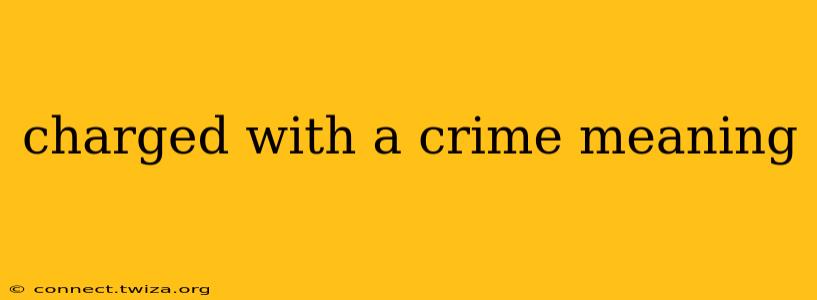Being "charged with a crime" is a serious legal event marking the beginning of a potentially lengthy and complex process. It signifies that law enforcement believes they have enough evidence to accuse you of committing a specific offense. This article will clarify what it means to be charged with a crime, outlining the steps involved and addressing common questions.
What Does it Mean to Be Charged with a Crime?
A criminal charge is a formal accusation by a prosecuting authority (usually the state or federal government) that an individual has committed a specific crime. This isn't just an arrest; it's a formal step initiated after an investigation where authorities believe there's sufficient probable cause to believe a crime occurred and the accused is responsible. This charge typically comes in the form of an indictment (a formal accusation by a grand jury) or an information (a formal accusation by a prosecutor). The charge outlines the specific crime(s) allegedly committed and details the circumstances surrounding the alleged offense.
What Happens After You're Charged with a Crime?
The process following a criminal charge can vary significantly depending on the jurisdiction, the severity of the crime, and other factors. Generally, the steps include:
- Arraignment: This is your first court appearance where you'll be formally informed of the charges against you. You will be asked to enter a plea (guilty, not guilty, or no contest).
- Pre-trial proceedings: This phase involves various legal maneuvers, such as discovery (exchanging evidence with the prosecution), motions to suppress evidence, and plea bargaining negotiations.
- Trial (if a plea agreement isn't reached): If the case proceeds to trial, evidence will be presented by both the prosecution and the defense. A judge or jury will determine guilt or innocence.
- Sentencing (if found guilty): If convicted, the court will impose a sentence, which could include fines, probation, community service, or imprisonment.
What are the Different Types of Criminal Charges?
Criminal charges range from minor offenses (misdemeanors) to serious felonies. The severity dictates the potential penalties. Misdemeanors typically result in fines or short jail sentences, while felonies can lead to lengthy prison terms and significant fines. Examples include:
- Misdemeanors: These are less serious crimes, such as petty theft or simple assault.
- Felonies: These are more serious crimes, such as robbery, burglary, assault with a deadly weapon, or murder.
What are My Rights if I'm Charged with a Crime?
The legal system provides various protections to those accused of a crime. These include:
- The right to remain silent: You do not have to speak to law enforcement without a lawyer present.
- The right to an attorney: If you cannot afford an attorney, one will be appointed to you.
- The right to a fair trial: This includes the right to a jury trial, the right to confront witnesses, and the right to present evidence.
- The right to due process: This ensures fair treatment throughout the legal process.
What is Probable Cause?
Probable cause is a requirement for law enforcement to make an arrest or obtain a warrant. It means that there is sufficient reason based on known facts to believe a crime has been committed and that the suspect committed it. This standard is lower than the "beyond a reasonable doubt" standard required for conviction at trial.
How Do I Find a Lawyer?
If you are charged with a crime, seeking legal counsel immediately is crucial. You can find a lawyer through referrals, online legal directories, or bar associations. Remember, your lawyer will guide you through the legal process and protect your rights.
This information is for general understanding and should not be considered legal advice. If you are facing criminal charges, it is essential to consult with a qualified attorney in your jurisdiction.
